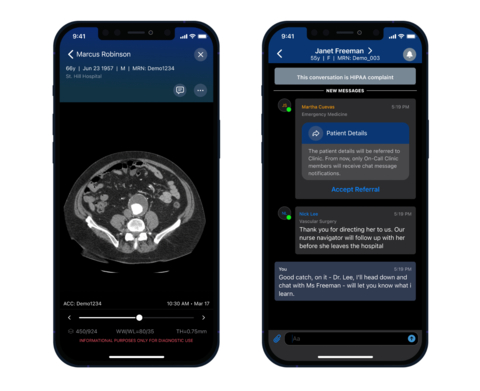Viz.ai, the leader in AI-powered disease detection and intelligent care coordination, today announced it has received U.S. Food and Drug Administration (FDA) 510(k) clearance for its algorithm intended to detect suspected abdominal aortic aneurysm (AAA). Viz AAA is the first FDA-cleared AI-powered solution for the detection and triage of suspected AAA.
“There is an estimated 1.1 million Americans living with an AAA. Majority of these patients are asymptomatic and many are unaware of their disease until a rupture occurs. This is a catastrophic medical emergency, resulting in over 10,000 deaths each year,” said Philip Batista, MD, Associate Program Director, Vascular and Endovascular Surgery Residency, Cooper. “This algorithm is a powerful new tool for healthcare professionals to more readily identify and capture individuals with AAA and, importantly, automatically refer those at imminent risk for rupture.”
“I look forward to the new aortic platform here at TriHealth, as its implementation will allow for enhanced identification, triage and team member communication, resulting in the best possible care for our aortic patients,” said TriHealth Vascular Surgeon Dr. Patrick Muck. “We’ve been using the Viz software for the detection of suspected pulmonary embolism over the last several months and have seen improvements in patient care across our institution.”
Viz AAA uses artificial intelligence to automatically search for the presence of an abdominal aortic aneurysm from computed tomography angiography (CTA) from any scanner in a hospital network. The new artificial intelligence (AI) algorithm and clinical workflow solution will be a part of the Viz™ AORTIC Module, an AI solution designed to accelerate treatment decisions for all aortic pathology.
An abdominal aortic aneurysm is a bulge in the abdominal aorta, the main artery that carries blood from the heart to the rest of the body. If left undetected and untreated, AAA can lead to a rupture, which is often fatal. According to the Centers for Disease Control and Prevention, AAA is responsible for more than 10,000 deaths each year in the United States alone. The software can be integrated into existing hospital workflows, allowing physicians to quickly and easily identify patients who may have a suspected AAA and take appropriate measures to prevent a rupture.
“AAA is an important and actionable incidental finding that is too-often missed,” said Jayme Strauss, chief clinical officer at Viz.ai. “The vision behind Viz AAA is to automatically catch and follow abdominal aortic disease, no matter the patient’s location. We believe that this product will enable care teams to prevent catastrophic aortic emergencies, such as aortic rupture, by increasing the surveillance of these patients.”
Viz.ai is working with leading hospitals and healthcare providers to implement Viz AAA into their clinical workflows. The company plans to continue to expand its offerings in the healthcare space, using AI to improve patient outcomes and revolutionize the way healthcare is delivered.


